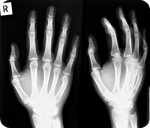Researchers have created the world’s thinnest sheet - a single atom thick - and used it to create the world’s smallest transistor, marking a breakthrough that could spark the development of super-fast computer chips.
This innovation will allow ultra small electronics to take over when the current silicon-based technology runs out of steam, according to Prof Andre Geim and Dr Kostya Novoselov from the University of Manchester.
They reveal details of transistors that are only one atom thick and fewer than 50 atoms wide in the journal, Nature Materials.
Scientists create world's thinnest material
Inventor's 2020 vision: to help 1bn of the world's poorest see better
 Some 30,000 pairs of his spectacles have already been distributed in 15 countries, but to Silver that is very small beer. Within the next year the now-retired professor and his team plan to launch a trial in India which will, they hope, distribute 1 million pairs of glasses.
Some 30,000 pairs of his spectacles have already been distributed in 15 countries, but to Silver that is very small beer. Within the next year the now-retired professor and his team plan to launch a trial in India which will, they hope, distribute 1 million pairs of glasses.
Scientists Discover New Element, the Heaviest Yet Known to Science
The new element, Governmentium (Gv), has one neutron, 25 assistant neutrons, 88 deputy neutrons, and 198 assistant deputy neutrons, giving it an atomic mass of 312.
These 312 particles are held together by forces called morons, which are surrounded by vast quantities of lepton-like particles called peons.z
Since Governmentium has no electrons, it is inert; however, it can be detected, because it impedes every reaction with which it comes into contact. A tiny amount of Governmentium can cause a reaction that would normally take less than a second, to take from 4 days to 4 years to complete.
Top Scientist Rails Against Hirings
The president of the nation's largest general science organization yesterday sharply criticized recent cases of Bush administration political appointees gaining permanent federal jobs with responsibility for making or administering scientific policies, saying the result would be "to leave wreckage behind."
"It's ludicrous to have people who do not have a scientific background, who are not trained and skilled in the ways of science, make decisions that involve resources, that involve facilities in the scientific infrastructure," said James McCarthy, a Harvard University oceanographer who is president of the American Association for the Advancement of Science. "You'd just like to think people have more respect for the institution of government than to leave wreckage behind with these appointments."
Evidence found of solar system around nearby star
For the first time, astronomers think that they've found evidence of an alien solar system around a star close enough to Earth to be visible to the naked eye.
They say that at least one and probably three or more planets are orbiting the star Epsilon Eridani, 10.5 light-years — about 63 trillion miles — from Earth. Only eight stars are closer.
Breakthrough Powder Regrows Lost Fingers
 An Ohio man completely regenerated a severed finger in only four weeks by applying a powder developed by researchers at the University of Pittsburgh.
An Ohio man completely regenerated a severed finger in only four weeks by applying a powder developed by researchers at the University of Pittsburgh.
The finger appears to have grown back completely, including the nerves, nail and even fingerprint. Spievak says that he has "complete feeling [and] movement."
Political views 'all in the mind'
 Scientists studying voters in the US say our political views may be an integral part of our physical makeup.
Scientists studying voters in the US say our political views may be an integral part of our physical makeup.
Their research, published in the journal Science, indicates that people who are sensitive to fear or threat are likely to support a right wing agenda. Those who perceived less danger in a series of images and sounds were more inclined to support liberal policies.
More Articles...
Page 60 of 61

 Science Glance
Science Glance






























